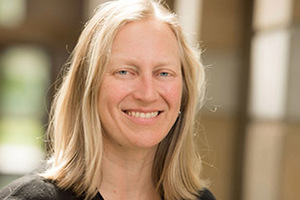

Catherine E. Bolten, Associate Professor of Anthropology and Peace Studies, will serve as a Distinguished Fellow of the Notre Dame Institute for Advanced Study (NDIAS) in spring 2017, when she will be one of 11 fellows in residence.
Cat’s research topic is “Taking Youth Seriously: Moral Panics and Young Men in Sierra Leone.” She specializes in post-war development in Sierra Leone, and her scholarship focuses primarily on globalization and the tensions and inequalities—intergenerational, rural/urban, and gendered—that emerge as people negotiate their daily lives.
Professor Bolten is the author of I Did It to Save My Life: Love and Survival in Sierra Leone (2012), which she wrote upon winning the University of California Press’s inaugural proposal competition in Public Anthropology. Her articles appear in American Anthropologist, Anthropological Quarterly, Comparative Studies in Society and History, The Journal of Anthropological Research, The Journal of Modern African Studies, African Conflict and Peacebuilding Review, and The Journal of Political Ecology. She is co-editing a special issue of Anthropological Quarterly addressing the 2014-15 Ebola outbreak in West Africa.
Professor Bolten’s research has been supported by major fellowships and grants from the United States Institute of Peace, Fulbright Institute of International Education, and David Boren National Security Education Program.
The NDIAS brings together leading thinkers from around the world to live and work at the University of Notre Dame as Fellows in a residential intellectual community. Distinguished Fellowships, like Professor Cat Bolten’s, are offered to scholars, artists, and scientists pursuing outstanding, innovative research in all disciplines—including the arts, humanities, social sciences, natural sciences, engineering, and law—that is directed toward, or extends inquiry to include, ultimate questions and questions of value, especially as they engage the Catholic intellectual tradition.
Inspired by the classical values of truth, goodness, and beauty, the NDIAS challenges its fellows to address fundamental and enduring questions about life, meaning, and purpose in relationship to their particular research projects, to examine how their findings might influence the world in positive and concrete ways, and to think through the ethical implications of their research.
The NDIAS strives to be the first place that comes to mind when scholars and scientists embark on major inter- or multidisciplinary projects that seek to relate specialized academic research to deeper inquiry about meaning and morality. By promoting collaboration across disciplinary boundaries, NDIAS offers its Fellows the opportunity to expand the scope of their inquiries to include consideration of the interconnected dimensions of the many pressing, inescapably ethical concerns of our time.
Contact: Catherine Bolten, (574) 631-509, cbolten@nd.edu